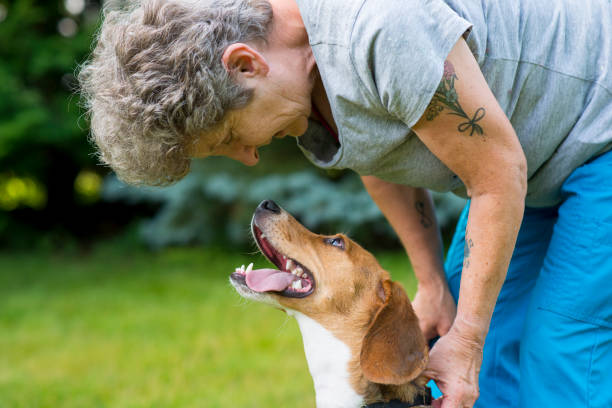Pets offer more than companionship; they contribute significantly to our overall well-being. Having a pet can improve cardiovascular health due to the increase in physical activity from regular walks and playtime. Emotionally, pets provide comfort and reduce feelings of loneliness and anxiety.
Interacting with pets has been shown to release endorphins, which enhance mood and create a sense of relaxation. In essence, pets enrich our lives physically, mentally, and emotionally, making us healthier and happier individuals.
Contents
- 1 Pets for Seniors
- 2 Overall Benefits of Pets for Every Person
- 2.1 Emotional Bonds with Pets
- 2.2 Therapeutic Benefits
- 2.3 Encouraging a Healthy Lifestyle
- 2.4 Overcoming Grief and Loss
- 2.5 Boosting Immune System
- 2.6 Enhancing Sleep Quality
- 2.7 Promoting Mindfulness
- 2.8 Sense of Security
- 2.9 Developing New Skills
- 2.10 Creating a Pet-Friendly Environment
- 2.11 Participating in Community Activities
- 3 Conclusion
Pets for Seniors
For seniors, owning a pet can be especially beneficial. The companionship of a pet can provide seniors with a renewed sense of purpose and routine, which is vital for mental and emotional well-being. Pets can also encourage seniors to stay active, whether it’s through daily walks with a dog or gentle playtime with a cat.
Physical Health Benefits
Owning a pet can be incredibly beneficial for seniors’ physical health. Daily activities like walking a dog or playing with a cat encourage regular exercise, which is crucial for maintaining mobility and cardiovascular health. Pets can also help manage weight and prevent obesity, a common concern among older adults.
Emotional Well-being
Pets provide unmatched emotional support for seniors. The bond formed between a pet and its owner can alleviate feelings of depression and loneliness, which are prevalent in the elderly population. The presence of a pet offers constant companionship and a reason to smile, boosting overall mental health.
Cognitive Function
Interaction with pets can help enhance cognitive function in seniors. Activities such as talking to or playing with pets can stimulate the mind, keeping it active and engaged. This could delay the onset of cognitive decline and improve memory retention.
Social Interaction
Owning a pet can also lead to increased social interactions. Walking a pet or visiting the vet provides opportunities for seniors to engage with others, reducing social isolation. Many seniors find themselves forming new friendships through their pets, whether with neighbors, fellow pet owners, or community members.
Sense of Purpose
Caring for a pet gives seniors a renewed sense of purpose. This responsibility fosters a routine and provides daily structure, which can be incredibly rewarding. The act of caregiving instills a feeling of being needed and valued, positively impacting self-esteem and overall life satisfaction.
Stress Reduction
Pets have a natural calming effect that can significantly reduce stress levels. The simple act of petting a cat or dog lowers blood pressure and decreases cortisol levels, promoting a sense of calm and well-being. This can lead to better stress management and improved overall health for seniors.
Overall Benefits of Pets for Every Person

Pets bring joy and health benefits to people of all ages, but their positive impact isn’t limited to any specific group. Whether you’re a child, an adult, or a senior, having a pet can transform your life in various ways. In this section, we will explore the overall benefits of pet ownership for everyone, highlighting how these loyal companions can enhance our lives irrespective of age or lifestyle.
Emotional Bonds with Pets
The emotional bonds formed between humans and pets are profound and impactful. These bonds go beyond basic companionship, intertwining with the emotional fabric of daily life. For seniors, pets become confidants and provide a shoulder to lean on during challenging times. These emotional connections can nurture a sense of love and belonging, which is particularly valuable for those living alone or away from family.
Therapeutic Benefits
Pets often serve as therapeutic aids without even realizing it. The presence of a pet can induce a state of calm and peace, offering therapeutic benefits similar to meditation or mindfulness practices. Animal-assisted therapy, which involves interactions with trained animals, is a growing field demonstrating significant improvements in mental and physical health among seniors experiencing various conditions, such as Alzheimer’s disease or chronic pain.
Encouraging a Healthy Lifestyle
Pets encourage their owners to lead healthier lifestyles. Seniors who walk their dogs regularly benefit from increased physical activity, exposure to fresh air, and a routine that supports cardiovascular health. Even pet-related chores like feeding and grooming contribute to a more active and engaged daily life.
Overcoming Grief and Loss
Pets can offer tremendous comfort and solace for seniors dealing with grief and loss. A pet’s unconditional love and nonjudgmental presence can help fill the emotional void left by the loss of a loved one. Pets can provide a sense of continuity and stability during times of emotional upheaval, assisting seniors in navigating their grief journey.
Boosting Immune System
Interactions with pets can have a positive impact on the immune system. Studies have suggested that pet owners, particularly those who spend a lot of time outdoors with their pets, tend to have stronger immune systems. The exposure to various microbes brought in by pets can help build a more resilient immune response, leading to improved overall health.
Enhancing Sleep Quality
Owning a pet can also enhance sleep quality for seniors. The routine of caring for a pet can help establish a consistent daily schedule, which is beneficial for maintaining healthy sleep patterns. The soothing presence of a pet can also reduce anxiety and promote relaxation, making it easier to fall asleep and enjoy a restful night.
Promoting Mindfulness
Pets naturally promote a state of mindfulness, encouraging owners to be present at the moment. Whether it’s a cat purring softly on a lap or a dog eagerly wagging its tail, these interactions draw attention away from worries and focus on the present. This mindfulness can alleviate stress and foster a sense of contentment and peace.
Sense of Security
Pets can provide a sense of security and protection, both emotionally and physically. Dogs, in particular, can act as loyal guardians, offering reassurance to seniors who may feel vulnerable. The presence of a pet can deter potential intruders and provide an added layer of safety in the home.
Developing New Skills
Caring for a pet can also lead to developing new skills and hobbies. Seniors might learn more about pet care and training techniques or even take up new activities such as gardening to grow their pet-friendly plants. These activities stimulate cognitive function and keep the mind engaged and active.
Creating a Pet-Friendly Environment
Creating a pet-friendly environment in the home is crucial for the health and happiness of both the pet and the owner. This can include safe spaces for the pet to explore, comfortable resting areas, and ensuring that the home is free from potential hazards. A well-thought-out environment enables the pet to thrive and the senior to enjoy a harmonious living arrangement.
Participating in Community Activities
Owning a pet can open doors to community activities and groups focused on animal lovers. Seniors can participate in events, join pet clubs, or volunteer at local animal shelters. These social engagements foster a sense of belonging and help seniors stay connected to their communities.
By understanding and embracing the myriad benefits pets can offer, seniors can enrich their lives in meaningful ways. Pets’ companionship and joy are unmatched, making them invaluable partners in the journey through the golden years.
Conclusion
Pets have a profound impact on seniors’ lives. They provide companionship emotional support, and encourage healthier lifestyles. Pets also offer therapeutic benefits and can help seniors overcome grief and loss. By creating a pet-friendly environment and actively participating in community activities, seniors can enjoy the full range of benefits that come with owning a pet. Ultimately, pets bring immense joy and fulfillment to the lives of their senior owners, making them cherished members of the family.

